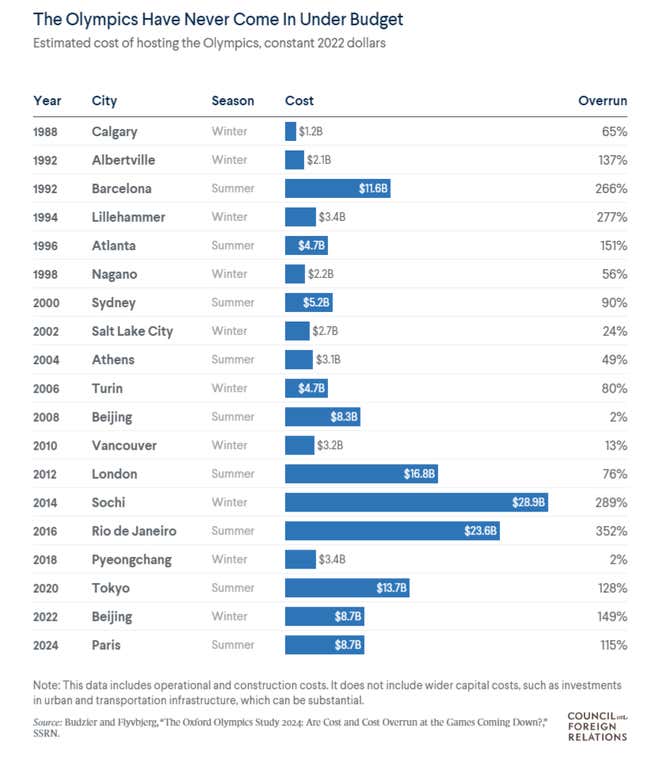
Hi, Quartz members!
It’s summer and it’s time for the Olympic Games. Every four years, some hapless city promises to rejuvenate the national economy and showcase the world’s first “affordable” Olympics. And yet they never do. Sochi overspent by 289%, Rio by 352%, London by 76%, and Tokyo by 128%. Today we’re taking a look at what’s happening in Paris, and why no one ever seems to be able to cover the costs of this Olympian endeavor.
An Olympian game of sucker
When French President Emmanuel Macron lights the Olympic Flame in Paris on July 26, he’ll open the 33rd Olympic Games with a shout: “Let the Games Begin!” Somewhere behind him on the stage, a senior French bureaucrat will be muttering to themselves: “Let the spending begin.”
France says it will spend a bit more than €8 billion ($8.75 billion) on this Olympic Games, the least expensive of the quadrennial global athletic contests since Barcelona spent $9.3 billion in 1992. Future host cities and the International Olympic Committee itself are looking to Paris as a harbinger of a new, less expensive games.
That’s because host cities and countries have spent tens of billions of dollars more than they promised their citizens when they bid to host the games. London in 2012 started with a budget of £2.4 billion; it spent £8.7 billion ($11.3 billion). Tokyo’s costs doubled to $13 billion, and an audit by the region’s governor found that off-budget costs for infrastructure and security boosted that to more than $30 billion.
This time, Paris and the IOC say it will be different. But will it?
For starters, Paris and the IOC agreed that they needed to keep costs down — that’s partly because when it came time in 2017 to compete for hosting the 2024 games, every city but Los Angeles and Paris dropped out, citing the pressure to build vast new facilities that would never be used again.
“Paris is going to be a little bit different, but also the same in that they are going to get some negative economic outcomes they did not anticipate,” said Andrew Zimbalist, a professor of sports economics at Smith College in Massachusetts and the author of books including Circus Maximus: The Economic Gamble Behind Hosting the Olympics and the World Cup. Every city underbids for the games, Zimbalist said, and then they move vast expenses off the budget, including infrastructure improvements like a Metro line extension, the construction of Olympic housing that will be sold to private owners after the games end, or the ever-mounting costs of security.
But Paris probably won’t be all that much different. “I won’t be surprised if all in, the costs are $15 billion for Paris, and the revenue from the games is just $5 billion to $6 billion,” Zimbalist said in an interview with Quartz.
Why is it all so costly?
The last three summer Olympics cost $51 billion in 2022 prices and busted budgets by a combined 185%, and that’s not including the cost of improving road, rail, airport, hotel, and other infrastructure, which was picked up by local and national governments. In fact, a group of Oxford economists warned last month that the cost of the Paris games has surged from €3.6 billion to €8.8 billion, and that’s just for the expenses that are on the books. Much infrastructure improvement and nearly all the security costs are not included in that tally. Similarly, Los Angeles, the 2028 summer games host, has revised its spending forecast from $5.3 billion to $6.8 billion.
The infrastructure costs for hosting an Olympics are massive: Cities must have at least 40,000 hotel rooms, dorms for 10,000 athletes, rail, metro, and airports that can move hundreds of thousands of fans, and then there are the stadiums and venues. Few cities have all the facilities that the Olympics’ 32 sports require: Velodromes and swimming stadiums, equestrian centers and rowing courses, not to mention enough stadiums for track and field, soccer, and of course a venue big enough to hold the opening ceremony.
“New sports facilities are death for an Olympics, that’s why you want to go to a place that already has facilities, like Paris,” says Victor Matheson, a sports economist and professor of economics at the College of the Holy Cross in Worcester, Mass. “No one wants a 10,000-seat swim facility, or a velodrome,” Matheson said in an interview, because using and maintaining them after the games costs a fortune. “That’s why you want to go to a place that has the facilities or make them temporary and not fancy.” And that, he says, is what makes Paris a potential game changer.
The City of Lights already has many of the facilities it needs, and some events will be held outside Pars where venues already exist, from surfing in Tahiti to sailing in the Mediterranean.
But even Paris’ attempts to cut costs may not work. As the economists writing for the Council on Foreign Relations noted recently, many stadiums become white elephants. Sydney’s Olympic stadium costs the city $30 million a year to maintain. Beijing’s famous “Bird’s Nest” stadium cost $460 million to build and requires $10 million a year to maintain.
“Reuse did not have the desired effect for Tokyo 2020 and also looks ineffective for Paris 2024,” the Oxford economists wrote.
“The IOC is much more considerate of host cities now than they were 10 years ago,” said Matheson. “They’re not requiring glitzy new stadiums for everything.” That’s important, Matheson says, because he says, “If Paris can’t make it work, with all the infrastructure it already has in place, what other city will want to bid for the games?”
The high cost of security
One of the biggest expenses, and one that appears to be largely off the books in Paris, is security. With wars boiling over in Gaza, Ukraine, Syria, and the former French colonies in West Africa, the potential for a terrorist attack on the games is significant. That cost is clearly being picked up by the national government and not by Paris’ Olympic Organizing committee, said Zimbalist.
Security costs have escalated quickly since the 9/11 attacks — Sydney spent $250 million in 2000 while Athens spent over $1.5 billion in 2004, and costs have remained between $1 billion and $2 billion since. They were even higher during the COVID-19 pandemic in 2022, when Tokyo reportedly shelled out $2.8 billion for disease prevention alone, according to the Council on Foreign Relations report.
But even those numbers may be vast underestimates. “The security costs they talk about are not real numbers, they are not including the national or regional costs,” for the army, intelligence services, or even regional police forces that assist the Paris police, Zimbalist said.
One graph

Let the spending begin! Thanks for reading, and have a great day.
— Peter Green, Weekend Brief writer